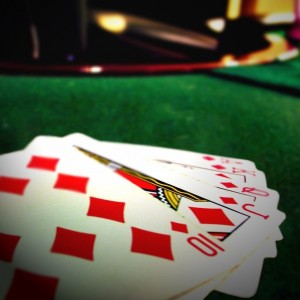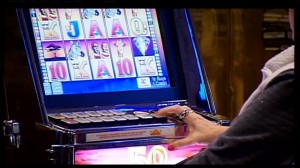Is Macao‘s gaming prosperity built on “often shady links to organised crime and racketeering” through the junket business? The South China Morning Post‘s Niall Fraser contends that it is. As of 2013, $202 billion in ill-gotten-gains were flowing through the enclave, according to the United States Congressional-Executive Commission on China. With junketeers looking farther afield, casino CEOs are suggesting unthinkable — that Macao might have peaked. “The number of junket representatives has shrunk dramatically over the last two years. It would have to regrow again to come back with the same vigor that we’ve experienced in the past. I’m not sure that’s going to happen because other locations are trying to pick up the excess market that’s no longer here,” said Las Vegas Sands CEO Sheldon Adelson last week.
Junkets are putting their resources into asset management, pawnbroking and mining, among many other activities, while “Others have sought to expand their gaming operations into jurisdictions with lax regulatory controls such as Saipan and Vanuatu,” reports This Week in Asia. “The increase in Macau’s casino revenue in recent years … has led to many people with triad and criminal backgrounds becoming millionaires,” said one industry insider, adding that the casino revenue was being plowed into plantations and vineyards, some right here in the good old U.S. of A. So while triad figures have no infiltrated the American casino industry, as was feared, there’s no keeping their money out of the country.
* Millennial problem? Motley Fool analyst Jeff Hwang says the casino industry doesn’t have one. In a pre-G2E jeremiad, he writes that “There is not a shred of objective evidence  to support the idea that there’s anything unusual about millennials in terms of their propensity for casino gambling.” The industry can’t compare the twenty somethings of today to those of, say, 1975 or even 1995. Harrah’s Entertainment didn’t incept Total Gold until 1997, leaving precious little player-tracking data from before 2000 upon which to draw. Also, while visitation to Las Vegas has grown exponentially since 1985, so has the amount of gambling available around the country: “Las Vegas is a crappy place for the average Joe to come to gamble, as most of America can find better value gambles at smaller stakes in the local casinos in their own backyards.”
to support the idea that there’s anything unusual about millennials in terms of their propensity for casino gambling.” The industry can’t compare the twenty somethings of today to those of, say, 1975 or even 1995. Harrah’s Entertainment didn’t incept Total Gold until 1997, leaving precious little player-tracking data from before 2000 upon which to draw. Also, while visitation to Las Vegas has grown exponentially since 1985, so has the amount of gambling available around the country: “Las Vegas is a crappy place for the average Joe to come to gamble, as most of America can find better value gambles at smaller stakes in the local casinos in their own backyards.”
“As a consequence, gambling is no longer a destination product, but an activity predominantly enjoyed by locals. In addition, the gambling product itself has changed  drastically, both due to technology and house advantages that have been on the rise for two decades,” writes Hwang. “It’s like complaining that people aren’t spending enough on movie tickets because they’re spending too much at the overpriced concession stand,” he adds of the amenity-driven Las Vegas of today. (This phenomenon was set in motion back in 1989, when Steve Wynn opened The Mirage.) Even then, Las Vegas may be attracting customers it didn’t back in its gaming-centric era. And today, companies like Pinnacle Entertainment and Boyd Gaming are predominantly reliant for gambling for their revenue (with only MGM Resorts International falling below the 50% mark).
drastically, both due to technology and house advantages that have been on the rise for two decades,” writes Hwang. “It’s like complaining that people aren’t spending enough on movie tickets because they’re spending too much at the overpriced concession stand,” he adds of the amenity-driven Las Vegas of today. (This phenomenon was set in motion back in 1989, when Steve Wynn opened The Mirage.) Even then, Las Vegas may be attracting customers it didn’t back in its gaming-centric era. And today, companies like Pinnacle Entertainment and Boyd Gaming are predominantly reliant for gambling for their revenue (with only MGM Resorts International falling below the 50% mark).
Adds Hwang, “The player needs to have an incentive to develop the skills. This means that at a minimum, a player who becomes proficient on a new skill-based game must be able to play at a lower house advantage — that is, lose at a slower rate — than the player would on a comparable skill-less slot machine at the same stakes.” He sets out a three-point  prescription for the casino business to regain its sanity including, “The industry needs to come to grips with the reality that the demand for casino gambling is not immune to basic economics.” The value of a dollar wagered has fallen for two decades, he argues, and the industry is counting on players being too dumb not to make the connection. Factor in a young generation weaned on Internet poker and similar games, to say nothing of daily fantasy sports, and you’re bound to have a disconnect. As Hwang wrote a year ago, “the slot player is losing more money faster than ever before. And there is ample evidence in recent years to suggest that this is now coming at the expense of volume.” In the years following the Great Recession, personal incomes rose but slot handle still fell. To conclude, the industry has a widespread problem and needs to wake up and smell the coffee. Besides, who came up with the crackpot notion that every dollar spent in a nightclub is one not spent gambling?
prescription for the casino business to regain its sanity including, “The industry needs to come to grips with the reality that the demand for casino gambling is not immune to basic economics.” The value of a dollar wagered has fallen for two decades, he argues, and the industry is counting on players being too dumb not to make the connection. Factor in a young generation weaned on Internet poker and similar games, to say nothing of daily fantasy sports, and you’re bound to have a disconnect. As Hwang wrote a year ago, “the slot player is losing more money faster than ever before. And there is ample evidence in recent years to suggest that this is now coming at the expense of volume.” In the years following the Great Recession, personal incomes rose but slot handle still fell. To conclude, the industry has a widespread problem and needs to wake up and smell the coffee. Besides, who came up with the crackpot notion that every dollar spent in a nightclub is one not spent gambling?
* A moment of silence, please, for Albert “Moky” Faccinto Sr., former director of casino operations at Caesars Palace and father of MGM President of International Marketing Albert “Big Al” Faccinto Jr. The elder Faccinto was credited with helping found Bishop Gorman High School and giving many an individual their start in the casino industry. Hailing from Dean Martin‘s hometown of Steubenvile, Ohio, Faccinto busted in as a dealer at the Frontier Club at age 21. He then worked his way up through the El Cortez and several Strip resorts, including the Riviera, before landing a pit boss gig at Caesars, where he steadily climbed the corporate ladder, retiring in 1985. Top that off with new forms of gambling like daily fantasy sports and it’s no wonder that the casino has to work harder for each gaming dollar. What’s more, there’s no industry consensus on the oft-invoked “skill-based” term means.

